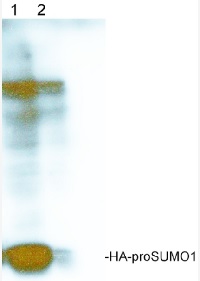1

Anti-SUMO1 | Small ubiquitin-like modifier protein 1
AS08 308 | Clonality: Polyclonal | Host: Rabbit | Reactivity: Arabidopsis thaliana, Oryza sativa, Solanum tuberosum
- Product Info
-
Immunogen: Recombinant proSUMO1 from Arabidopsis thaliana Q547B9, At4g26840 with a his tag
Host: Rabbit Clonality: Polyclonal Purity: Total IgG. Protein G purified in PBS pH 7.4. Format: Lyophilized Quantity: 0.5 mg Reconstitution: For reconstitution add 50 µl of sterile water Storage: Store lyophilized/reconstituted at -20°C; once reconstituted make aliquots to avoid repeated freeze-thaw cycles. Please remember to spin the tubes briefly prior to opening them to avoid any losses that might occur from material adhering to the cap or sides of the tube. Tested applications: Western blot (WB) Recommended dilution: 1 : 1000-1 : 5000 (WB) Expected | apparent MW: 10.97 | 12 kDa - Reactivity
-
Confirmed reactivity: Arabidopsis thaliana, Oryza sativa, Solanum tuberosum
Predicted reactivity: Glycine max, Marchantia polymorpha, Nicotiana benthamiana, Nicotiana tabacum, Picea sitchensis, Pisum sativum, Populus trichocarpa, Solanum lycopersicum, Zea mays
Species of your interest not listed? Contact usNot reactive in: No confirmed exceptions from predicted reactivity are currently known - Application Examples
-
Application example 
Arabidopsis thaliana total cell extract HA-proSUMO1 (HA-epitope and pro-Small Ubiquitin like MOdifier protein1 (1), empty vector only (2), were separated on 15% gel, SDS -PAGE and blotted on PVDF membrane. Filters were blocked in 5% milk for 1h, incubated with 1: 1 000 anti-AtSUMO1 antibody (AS08 308) for 1 h, followed by incubation with 1: 15 000 secondary anti-rabbit antibodies (1h) coupled with HRP and visualization (10 seconds exposure) with standard chemiluminescent detection reganet.
Note: signal in the empty vector lane comes from endogenous SUMO1 detected by the antibody. - Additional Information
-
Additional information (application): Antibodies will also detect SUMO2 protein. Suggested extraction buffer: 100 mM Tris-HCl, pH 8.0, 0.1% [w/v] SDS, 0.5% [w/v] sodium deoxycholate, 1% [v/v] glycerol, 50 mM sodium metabisulfite, 20 mM N-ethylmaleimide (NEM) and protease inhibitor cocktail (Roche) (Orosa et al. 2018). This buffer will help to stabilize the conjugates and will help to detect any increase or decrease in conjugate accumulation using the antibodies.
- Background
-
Background: SUMO1 - Small Ubiquitin-like Modifier ubiquitin like protein binds in reversible way to various protein targets and plays a role as a signaling regulator.
- Product Citations
-
Selected references: Xiao et al. (2024). Small ubiquitin-like modifier protease gene TaDSU enhances salt tolerance of wheat. New Phytologist, October 2024.
Szadeczky-Kardoss et al. (2022) Elongation factor TFIIS is essential for heat stress adaptation in plants. Nucleic Acids Res. 2022 Feb 28;50(4):1927-1950. doi: 10.1093/nar/gkac020. PMID: 35100405; PMCID: PMC8886746.
Colignon et al. (2019). Dual coordination of the SUMOylation and phosphorylation pathways during the response to heat stress in Solanum tuberosum. Environmental and Experimental Botany Volume 162, June 2019, Pages 192-200.
Rosa et al. (2018). Insights into the transcriptional and post-transcriptional regulation of the rice SUMOylation machinery and into the role of two rice SUMO proteases. BMC Plant Biol. 2018 Dec 12;18(1):349. doi: 10.1186/s12870-018-1547-3.
Guo et al. (2017). Sumoylation stabilizes RACK1B and enhance its interaction with RAP2.6 in the abscisic acid response. Sci Rep. 2017 Mar 8;7:44090. doi: 10.1038/srep44090.
Tomanov et al. (2014). Arabidopsis PIAL1 and 2 Promote SUMO Chain Formation as E4-Type SUMO Ligases and Are Involved in Stress Responses and Sulfur Metabolism. Plant Cell. 2014 Nov;26(11):4547-60. doi: 10.1105/tpc.114.131300.
Liu et al. (2014). SUMO E3 ligase AtMMS21 is required for normal meiosis and gametophyte development in Arabidopsis. BMC Plant Biol. 2014 Jun 3;14:153. doi: 10.1186/1471-2229-14-153.
Kong et al. (2014). Quantitative proteomics analysis reveals that the nuclear cap-binding complex proteins Arabidopsis CBP20 and CBP80 modulate the salt stress response. J Proteome Res. 2014 Apr 1. - Protocols
-
Agrisera Western Blot protocol and video tutorials
- Reviews:
-
Yordan Muhovski | 2019-11-20The plant material was Arabidopsis thaliana plants subjected to heat shok (35 and 45°C) and control. The proteins were extracted from leaves and the used anti-SUMO dilution was 1:1000. The purpose of the study was to observed the changes in the plant SUMOylome due to heat stress.


